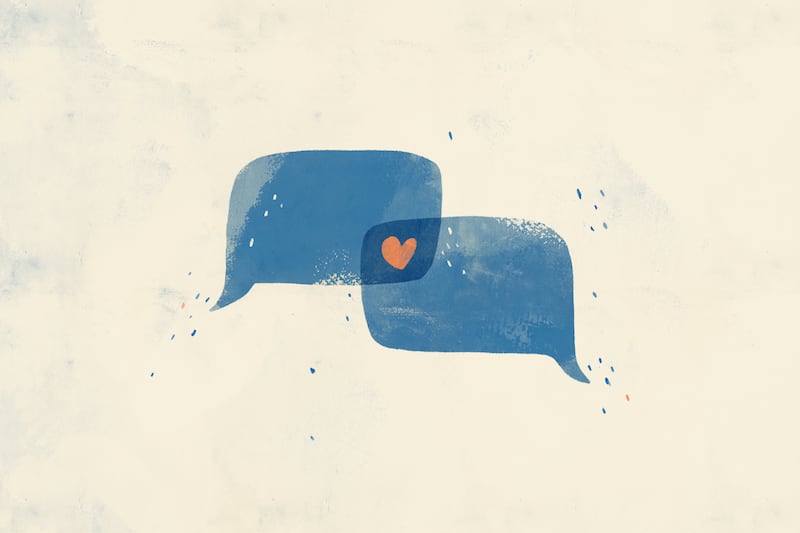From Bumble to Tinder, Mutual and Hinge, each dating app boasts of love and excitement. But their effects can be diverse — some users leave with a relationship, while others end up with the emotional weight of loneliness, anxiety, low self-esteem, body insecurity and depression.
I dabbled in dating apps when I turned 18. I painfully scoured each photo I put on a profile, wondering if my eye was too squinty, if my smile might be crooked, if that shadow on my face made my skin look bad. I read and reread — and reread again — the bio and wondered if it read as “clever” or “trying too hard.” I worried more about what my own profile looked like than the people I was swiping on.
I went on dates — bad dates with uncomfortable people, better dates with people who made me laugh, cringy dates that should have ended quickly but somehow stretched on for hours.
But my primary emotion was not excitement or connection or love. I felt stressed — like I had to prove myself in some speed round get-to-know-you before they swiped on the next person in line. And what increased my anxiety was what one Huffpost author penned as the problem of “casual communication.”
Who has been here?
They start a conversation with a low-effort “hey,” they don’t bother responding, they don’t invest, they ghost.
And why not? The matches will expire and they never have to invest emotionally if they don’t want to. On dating apps, the dead ends pile up — and I quickly grew emotionally exhausted of swiping.
In 2002, Wired Magazine wrote that “twenty years from now, the idea that someone looking for love won’t look for it online will be silly.” It’s been 20 years now, and it might feel like dating apps are the only way to meet new people. But they can also introduce you to a host of mental health struggles.
From my short spurt with dating apps, I quickly learned that they brought out an aspect of my personality — high attention to detail and a background of body image insecurity — that made me an exact match for dating app anxiety.
I left the dating app world not long after joining and jumped into what I called “network dating” where I met people through friends, social gatherings and school events. Instead of giving someone five pictures of myself and a bio line, I relied on the art of verbal banter.
It wasn’t easy putting myself out there time after time. I still felt nervous talking to someone new, but it wasn’t an anxious, insecure nervous — it was excitement. That unhealthy hyperfocus on my own insecurities faded into the background as I talked with new people, face to face.
In a dating app, you get a few seconds (if that) to show someone who you are. In person, you get as long as you can hold their attention. I felt that my speaking skills were stronger than my selfies.
The day I met my husband was a muggy summer day before my senior year of college.
My roommates and I ended up at Mona rope swing for a potluck. I wandered around, popping grapes into my mouth while we talked and watched people flip, dive and belly-flop into the water.
From a short distance away, I saw a guy walk up in a brown T-shirt. I didn’t know him, but I liked the way he smiled, and I convinced myself to walk up to him. While it crossed my mind that I was wearing thrifted boys jean shorts from the ’90s, no makeup, and third-day hair, I didn’t feel the anxieties I had felt on the dating apps. I felt confident in my ability to charm him through conversation.
And charm him I did — if mild embarrassment is charming. We talked for 30 minutes, and I accidentally gave him a friend’s phone number — a mistake I didn’t get to correct until just before leaving the potluck. Our first conversation was new and awkward and amusing, but it meant something to both of us. We built a relationship on conversations.
Dating apps are great for many people, but the mental health effects can make it counterproductive for some of us by replacing the excitement of dating with anxiety and stress. According to research conducted by BMC Psychology in 2020, swipe-based dating apps contribute to significantly higher levels of emotional distress, anxiety and depression. A 2019 study from the Journal of Eating Disorders showed that dating app users have substantially higher odds of engaging in unhealthy weight control behaviors. Pew Research in 2020 reported that 25% of dating app users found it made them feel more insecure.
Dating doesn’t have to look one way. It can be intimidating to go back to a good old fashioned hello, but maybe it’s the refresh some of us need instead of paying the high price of mental health.


